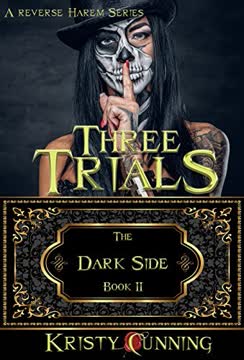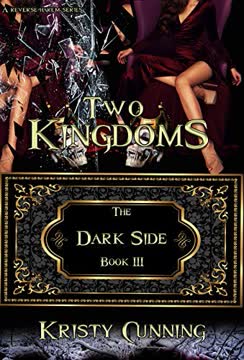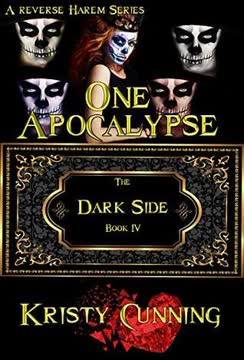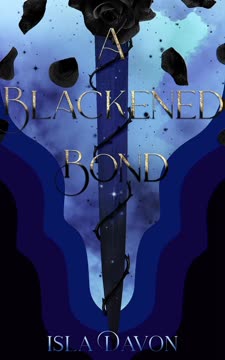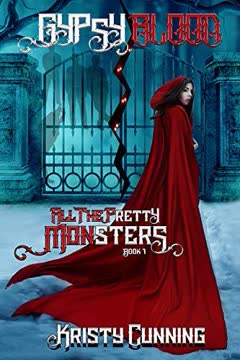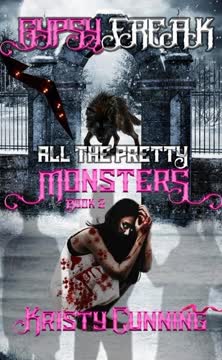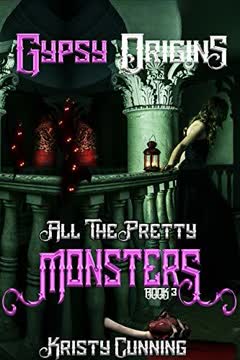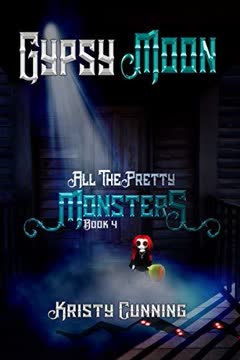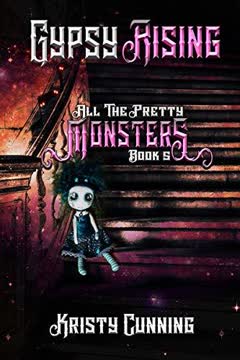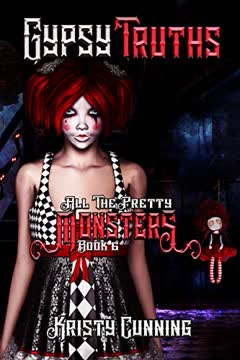Plot Summary
Devil's Deadly Game Begins
The story opens with Paca and her four bonded men—Jude, Gage, Kai, and Ezekiel—thrust into a deadly game orchestrated by Lucifer, the Devil himself. The rules are simple: survive the course in hell's belly, a place no outsider has ever escaped, or perish. The group quickly realizes that Lucifer's games are more than just tests of strength; they are riddled with illusions, traps, and psychological warfare. Paca's powers, which are tied to her emotional state and her connection to the men, flare unpredictably. The Devil's interest in Paca is piqued, especially as her abilities seem to defy the rules of hell. The group's trust in each other is tested as they navigate the first leg of the course, setting the stage for a journey that is as much about survival as it is about uncovering hidden truths.
Through Hell's Belly
Paca and her men are forced to choose between a fiery mountain and a black, ashy forest, both teeming with monstrous threats. Their powers are limited, and the environment is designed to break them physically and mentally. As they climb, fight, and strategize, Paca's unique abilities—her ability to go "phantom" and her acid touch—prove both a blessing and a curse. The group's dynamic is laced with banter, sexual tension, and deepening emotional bonds, but also with the ever-present threat of betrayal and death. The trials force them to confront not only external dangers but also the complexities of their relationships and the mysterious nature of Paca's existence.
Riddles and Revelations
The trials are not just physical but intellectual, with riddles embedded in each obstacle. Paca's quick thinking and ability to "record" and mimic powers become crucial. The group faces monstrous beetles, hellfire lakes, and screaming vines, each requiring a unique solution. The riddles are more than puzzles—they are keys to understanding the true nature of hell, the balance of power, and the reason for the trials themselves. As they progress, it becomes clear that the trials are designed to reveal something about Paca and her connection to the four men, hinting at a deeper, cosmic significance.
Monsters, Trials, and Bonds
The group's journey through hell's belly is marked by encounters with grotesque monsters and deadly traps. Each challenge tests their physical limits and the strength of their bond. Paca's powers are both a weapon and a liability, often triggered by her desire to protect the men. The trials force the group to confront their feelings for each other, their pasts, and the nature of their connection. Sexual tension and emotional vulnerability intertwine, revealing the depth of their loyalty and the dangers of their growing attachment.
Black Ice and Burning Pain
A deadly rain of "black ice" threatens to kill the group, infecting them with a freezing, spreading decay. Paca's ability to heal the men by physical contact becomes their only hope, but it comes at a cost—her own pain and vulnerability. The ordeal exposes the group's dependence on Paca and the unique nature of her powers. The experience deepens their bond, but also raises questions about the true source of Paca's abilities and the price of their survival.
Night in the Screaming Forest
After surviving the black ice, the group takes refuge in a cave, sharing a rare moment of peace. The night is filled with confessions, banter, and the exploration of their complex relationships. Paca's presence brings comfort and rest to the men, highlighting her role as both protector and emotional anchor. The group's dynamic shifts as they confront their feelings, fears, and the reality of their situation. The night serves as a turning point, solidifying their bond and setting the stage for the final trials.
The Blind Tribe's Ambush
The group is attacked by the blind tribe, a horde of chameleon-like, cannibalistic warriors who see by "cool signatures." The battle is chaotic and brutal, forcing the group to use every ounce of their power and cunning. Paca's ability to go phantom and her acid touch are crucial, but the fight reveals the limits of their strength and the dangers of hell's denizens. The encounter underscores the importance of their bond and the necessity of trust and cooperation.
Surviving the Impossible
The group faces a final, seemingly insurmountable obstacle: a stampede of hell's monsters. Paca realizes that the only way to survive is to become the most terrifying predator, using her powers and fearless demeanor to part the sea of beasts. The group follows her lead, escaping the trial and returning to the mortal world. The experience leaves them changed, their bond stronger but their questions deeper. The return is bittersweet, as they realize that the true game is only beginning.
Resurrection and Treacherous Treasure
After a betrayal by an old ally, Paca is mortally wounded and dies, only to awaken in a grave, naked and alone. Her resurrection is marked by pain, confusion, and a burning need to reunite with her men. The experience reveals the depth of their bond—her pain and destructive power are linked to their separation and emotional turmoil. Paca's gravestone reads "Comoara Trădătoare" ("Treacherous Treasure"), a mysterious endearment that hints at her true identity and the nature of her connection to the men.
The Truth About Paca
As Paca and her men reunite, they begin to unravel the mysteries of her origin. With the help of Lamar, an enigmatic ally, they discover that Paca is not just a powerful spirit but the Devil's youngest daughter, the embodiment of the Apocalypse. Her memories are fragmented, but clues from journals, old friends, and the trials themselves reveal that she once gave each man a piece of her balance, binding them together in a way that defies the laws of hell. The revelation shakes the group, forcing them to confront the implications of their bond and the dangers that come with it.
The Four Horsemen Revealed
The group learns that Jude, Gage, Kai, and Ezekiel are not ordinary men but the reincarnated Four Horsemen of the Apocalypse—Death, Famine, Conquest, and War. Their powers, personalities, and bond are the result of Paca's intervention centuries ago, when she saved them from madness and gave them a piece of her own balance. The revelation explains their unique abilities, their connection to Paca, and the reason for the Devil's interest in them. It also raises the stakes, as their existence threatens the balance of hell and the mortal world.
Apocalypse's Forgotten Past
Through journals, stories, and Lamar's guidance, Paca begins to piece together her forgotten past. She learns of her creation as the Devil's daughter, her role as the Apocalypse, and her centuries-long quest to find and save the Four Horsemen. Her lack of conscience, her unique blend of purities and impurities, and her ability to love fiercely and selfishly set her apart from the other children of hell. The group's mortal lives, their repeated love stories, and their tragic deaths are revealed as part of a cosmic cycle orchestrated by Paca herself.
The Devil's Daughter Returns
Determined to uncover the truth and protect her men, Paca returns to hell, confronting old allies and enemies. She learns that her death and resurrection have upset the balance, making her both a target and a threat. The Devil's true motives remain unclear, but it is evident that Paca's existence—and her bond with the Horsemen—holds the key to the fate of both hell and the mortal world. Paca's struggle to reconcile her identity, her powers, and her love for the men drives her to make bold, dangerous choices.
Secrets, Loyalties, and Power
Paca and her men are drawn into the complex politics of hell, where loyalties are uncertain and power is everything. Betrayals by old friends, the threat of rebellion, and the Devil's manipulations force the group to question whom they can trust. Paca's ability to command others, her growing powers, and her unique perspective make her both a weapon and a liability. The group must navigate shifting alliances, uncover hidden agendas, and prepare for the inevitable confrontation with the Devil.
The Harem's Reunion
After surviving death and betrayal, Paca and her men reunite, healing old wounds and rediscovering the depth of their love and loyalty. Their bond is tested and strengthened through shared vulnerability, sexual intimacy, and the realization that they are each other's only true family. The group's dynamic shifts as they embrace their roles as the Apocalypse and the Four Horsemen, preparing for the battles to come.
Apocalypse's Choice
Armed with new knowledge and power, Paca faces a choice: seek vengeance against the Devil for past betrayals, or strive to restore balance and protect those she loves. Her decision is complicated by her lack of conscience, her fierce love, and the realization that her actions have consequences for the entire world. The group's fate—and the fate of hell itself—hangs in the balance as Paca prepares to confront her father and claim her place as the Apocalypse.
Facing the Devil
In the final confrontation, Paca faces Lucifer, revealing her true identity and the extent of her power. She realizes that the only way to break the cycle of death and betrayal is to make a deal with the Devil himself. The story ends with Paca standing before her father, ready to negotiate the terms of her existence and the future of the Four Horsemen. The outcome remains uncertain, but Paca's transformation from lost spirit to the Apocalypse is complete, setting the stage for the next chapter in her journey.
Characters
Paca (Apocalypse)
Paca is the enigmatic, fiercely independent anti-heroine of the story. Created by Lucifer as the embodiment of the Apocalypse, she is a being of perfect balance—neither wholly good nor evil, but a blend of purities and impurities. Lacking a conscience but capable of deep, selfish love, Paca's existence is defined by her connection to the Four Horsemen, to whom she gave pieces of her own balance centuries ago. Her journey is one of self-discovery, as she uncovers her forgotten past, navigates the politics of hell, and struggles to protect those she loves. Paca's psychological complexity lies in her simultaneous desire for connection and her fear of vulnerability, her capacity for both destruction and healing, and her relentless pursuit of agency in a world that seeks to control her.
Jude (Death)
Jude is the embodiment of Death, the most guarded and analytical of the four men. He is fiercely protective, often the first to challenge Paca and the last to trust. His relationship with Paca is marked by tension, banter, and a deep, unspoken loyalty. Jude's psychological struggle centers on his fear of losing control, his reluctance to embrace vulnerability, and his need to preserve the bond that holds the group together. As Death, he wields the power of decay and finality, but his true strength lies in his unwavering commitment to those he loves.
Gage (Famine/Nicholai)
Gage is Famine, known for his calm demeanor, strategic mind, and subtle sense of humor. He is Paca's confidant and often her voice of reason, though he is not above challenging her when necessary. Gage's powers revolve around draining energy and life, but his true role is as the group's anchor, providing stability and perspective. His psychological journey is one of acceptance—of his past, his power, and his place in Paca's heart. Gage's loyalty is fierce, and his willingness to sacrifice for the group is matched only by his desire for connection and understanding.
Kai (Conquest/Pestilence)
Kai is Conquest (sometimes associated with Pestilence), the most impulsive and passionate of the four. He thrives on challenge, craves attention, and is driven by a need to be desired. Kai's relationship with Paca is marked by playful antagonism, sexual tension, and moments of surprising vulnerability. His powers are infectious—literally and figuratively—spreading both disease and desire. Psychologically, Kai grapples with his fear of being overlooked, his need for validation, and his struggle to balance selfishness with loyalty.
Ezekiel (War)
Ezekiel is War, the group's most physically imposing and emotionally complex member. He is both a source of chaos and a bringer of peace, capable of inciting conflict and soothing wounds. Ezekiel's bond with Paca is rooted in mutual respect, shared trauma, and a deep, unspoken understanding. His psychological journey is one of reconciliation—between his violent nature and his desire for love, between his role as a warrior and his need for peace. Ezekiel's loyalty is absolute, and his willingness to fight for those he loves is both his greatest strength and his greatest vulnerability.
Lucifer (The Devil)
Lucifer is the architect of the trials, the ruler of hell, and Paca's father. His motives are shrouded in mystery, his actions driven by a desire to maintain balance, assert control, and test the limits of his children. Lucifer's relationship with Paca is complex—part pride, part fear, part manipulation. He is both a creator and a destroyer, a figure of authority and a source of chaos. Psychologically, Lucifer embodies the paradox of power: the need to control and the inevitability of rebellion.
Lamar
Lamar is a balance elder, a friend to Paca, and a source of crucial information. He straddles the line between loyalty and self-preservation, offering guidance while harboring his own secrets. Lamar's role is that of the wise counselor, but his motivations are not always clear. He is both a mirror for Paca's journey and a reminder of the dangers of trust in a world built on deception.
Lake
Lake is a former lover and ally, now revealed as a traitor. Her betrayal is a catalyst for Paca's death and resurrection, exposing the dangers of misplaced trust and the complexities of hell's politics. Lake's character embodies the themes of envy, ambition, and the high cost of loyalty in a world where power is everything.
Manella
Manella is another of Lucifer's children, a figure of mystery and shifting allegiances. His relationship with Paca is marked by rivalry, affection, and the shared burden of their father's expectations. Manella's role is that of the ambiguous ally, his true motives hidden beneath layers of charm and cunning.
The Gemini Twins
The Gemini Twins are two of Lucifer's children, embodying duality, chaos, and the unpredictable nature of hell's politics. Their actions are driven by whim, rivalry, and a desire to disrupt the status quo. The twins serve as both comic relief and a reminder of the dangers of unchecked power.
Plot Devices
Trials as Metaphor
The structure of the book is built around a series of deadly trials, each designed to test not only the group's physical and mental endurance but also their emotional bonds and sense of self. The trials serve as a metaphor for the journey of self-discovery, the struggle for balance, and the dangers of unchecked power. Each obstacle is both a literal threat and a symbolic challenge, forcing the characters to confront their fears, desires, and the true nature of their connection.
Amnesia and Fragmented Memory
Paca's amnesia and the gradual recovery of her memories are central to the narrative. The loss of memory creates suspense, drives the plot, and allows for the gradual revelation of crucial information. The device also serves to explore themes of identity, agency, and the power of the past to shape the present.
Bonded Powers and Emotional Resonance
The unique powers of Paca and the Four Horsemen are intrinsically linked to their emotional states and their bond with each other. This device blurs the line between magic and psychology, making the characters' internal struggles as important as their external battles. The resonance between power and emotion underscores the themes of love, loyalty, and the dangers of imbalance.
Riddles and Foreshadowing
The use of riddles throughout the trials serves as both a plot device and a form of foreshadowing. Each riddle is a clue to the true nature of the characters, the rules of hell, and the cosmic stakes of their journey. The riddles also reinforce the theme of knowledge as power and the importance of perspective in solving seemingly impossible problems.
Reincarnation and Cosmic Cycles
The revelation that Paca and the Four Horsemen have lived countless lives together, always finding and losing each other, adds a layer of cosmic tragedy and inevitability to the story. This device explores themes of fate, free will, and the possibility of breaking the cycle through self-awareness and choice.
Analysis
Three Trials is a dark, witty, and deeply psychological exploration of love, power, and identity set against the backdrop of hell's most dangerous games. At its core, the novel is about the search for self in a world designed to obscure the truth, the struggle to maintain balance in the face of overwhelming chaos, and the transformative power of love—even when that love is selfish, flawed, and fiercely protective. Through Paca's journey from lost spirit to the embodiment of the Apocalypse, the story interrogates the nature of agency, the cost of loyalty, and the possibility of redemption for even the most damaged souls. The trials, riddles, and betrayals are not just obstacles but mirrors, reflecting the characters' deepest fears and desires. In a modern context, the book resonates as a meditation on trauma, resilience, and the ways we construct meaning and connection in a world that often feels hostile and absurd. Ultimately, Three Trials challenges readers to question the boundaries between good and evil, strength and vulnerability, and to embrace the messy, complicated beauty of being both treacherous and treasured.
Last updated:
Review Summary
Three Trials received mostly positive reviews, with readers praising its humor, character development, and world-building. Many enjoyed the deepening relationships between the protagonist and the four male characters. The book provides answers to questions raised in the first installment while introducing new mysteries. Some readers found the pacing uneven and wanted more romantic scenes. Overall, fans of paranormal reverse harem stories found it entertaining, with a mix of action, comedy, and romance.
The Dark Side Series
Similar Books
Download PDF
Download EPUB
.epub digital book format is ideal for reading ebooks on phones, tablets, and e-readers.
